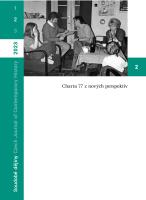Charta 77 jako "dílna"
Charter 77 "Workshop"
Author(s): Marek SukSubject(s): History, History of ideas, Political history, Post-War period (1950 - 1989), History of Communism
Published by: AV ČR - Akademie věd České republiky - Ústav pro soudobé dějiny
Keywords: Czechoslovakia;Charter 77;Charter 77 documents;Charter 77 "workshop";dissent;Czechoslovak normalization;Roma;"The Right to History" document
Summary/Abstract: The subject of the article is the hitherto unexplored process of the creation and publication of the Charter 77 documents – documents that fundamentally presented the opinions and analyses of this most important dissident initiative in Czechoslovakia between 1977 and 1989. They covered the state of human and civil rights in the country, various other social and political issues, and the situation of dissent itself. The author refers to this process as a “workshop”, which he understands figuratively as a thinking and creative environment in which ideas, proposals and suggestions are born and implemented. In order to analyse the functioning of the Chartist “workshop”, he chooses six documents with different content, for the creation of which we have diverse historical sources. Using the examples of the basic document “Declaration of Charter 77” of 1 January 1977, the “Communication of Charter 77” (on the conclusions of the internal discussion on the further work of the Charter from September of the same year), and the position of the spokespersons of Charter 77 (on the discussions on the mission and activities of the Charter from October 1978), the author shows how appropriate ways of further activity were sought within this community and how the written “workshop” rules were enforced. Using a document on the situation of the Roma in Czechoslovakia from December 1978, a so-called “economic” document from May 1979 (known as “Theses on Consumption”), and an analysis of the state of Czechoslovak official historiograpghy from May 1984 (known as “The Right to History”), the author illustrates the Chartists’ problems in adhering to the agreed “workshop” rules, their ability to overcome these problems, and the fact that they “produced” Charter documents in two ways. In the first case, the interested parties created an informal group to work on a topic, then incorporated – selectively – the received comments, and then submitted the text (by themselves or through intermediaries) to the speakers for their signature on behalf of the entire Chartist community. In the second case, the Charter spokespersons “produced” the document by signing their own text or a text they had received without consulting anyone. This was precisely the case with the document “The Right to History” (Právo na dějiny), which provoked widespread controversy among Czechoslovak dissenters.
Journal: Soudobé Dějiny
- Issue Year: XXX/2023
- Issue No: 2
- Page Range: 385-413
- Page Count: 29
- Language: Czech

